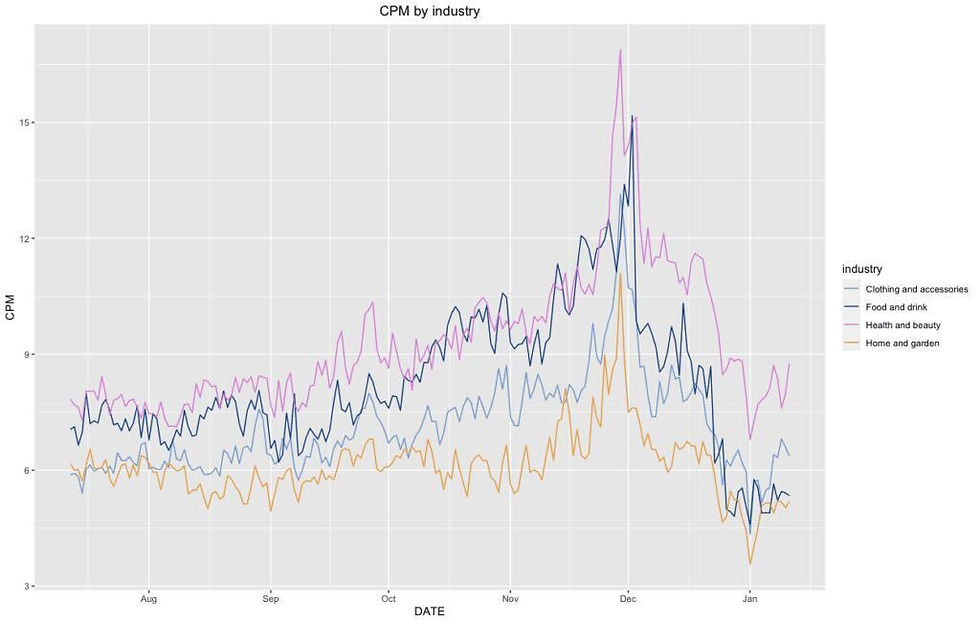The Complete 2025 BFCM + Holiday Season Strategy You Need
- SKHB
- Aug 28, 2025
- 3 min read

By the end of Cyber Week 2024, U.S. shoppers had spent $41.1 billion online—a record high and an 8% jump from the year before. Black Friday alone brought in $10.8 billion, and Cyber Monday closed with $13.3 billion in sales.
At first glance, the revenue numbers look amazing… but for brands bleeding millions on ad spend, is the profit really as much?
Historically, Q4 has always been the most expensive quarter for ad costs. The holiday gold rush turns ad platforms into the most expensive game in town. That means while revenue numbers look “sexy”, margins get eaten alive by rising acquisition costs and heavy discounting.
The brands that win BFCM (Black Friday, Cyber Monday) aren’t the ones throwing last-minute ads into the void. They’re the ones with strong retention systems ready to catch the profit leaks.
The Paid Ads Problem in Q4
Every November, the same cycle plays out.
Competition spikes → CPMs climb → ROAS drops → brands slash prices deeper → margins disappear.
Meta’s ad costs rose more than 20% between 2020 and 2023, while TikTok CPMs more than tripled in that same window. And by the time Black Friday hits, CPMs can surge up to 66% compared to the rest of the year.

It’s the perfect storm: you’re paying more to reach customers while offering steeper discounts to convert them. On the surface, revenue looks bigger… but underneath, profit gets squeezed thin.
While most brands keep playing this losing game, you don’t have to. Instead of dumping more budget into ads that barely break even once discounts are factored in, you can build a retention system that monetizes every click, doubling your profit on the back end.
The truth is simple: in Q4, ads will acquire traffic. But only your retention systems, such as email and SMS, can turn that traffic into profit. And for that to happen, timing is everything!
Why Timing Is Everything
BFCM isn’t a one-time thing. It’s a sequence of back-to-back events, and each stage calls for a different play.
Attention comes in waves.Customers pay attention in the days leading up, on Black Friday itself, when Cyber Monday rolls in, and again when the focus shifts to gifting and shipping deadlines. Miss one of those waves and you leave money on the table.
The winners don’t just discount harder. They plan campaigns that land with precision—warming the list early, rotating offers throughout the waves, and shifting messaging as the season moves forward. You can beat one of the biggest conversion killers by following this approach: offer fatigue.
Offer fatigue happens when customers see the same deal recycled until it loses all urgency.
Run a BOGO (Buy One, Get One) on Black Friday and then push the same offer into December, and your audience tunes out. Instead, try mixing it up.
Store credits that encourage repeat purchases
Giveaways to build early excitement before discounts drop
Straight discounts for Black Friday (BOGO, 50% off, etc.)
Bundles in December to drive higher cart
Digital gift cards for last-minute shoppers racing the clock
With offers out of the way, it’s time to nail the scheduling.
The BFCM Sending Schedule
Even the strongest offer will flop if it lands at the wrong time. If you don’t map out your sends, you either get lost in the noise… or worse, you burn out your list by blasting without a plan.
The goal here is rhythm.
A sending cadence that builds hype before the flood, peaks during the big moments, and keeps attention alive well into December.
Here’s how to do it:
Early Access (Nov 13–24)
Email: Every other day → ramp up as the offer closes
SMS: 3–4 total (launch, reminders, final day)
Black Friday (Nov 26–30)
Email: 2 per day (AM launch + PM reminder)
SMS: 1 per day (highlight urgency)
Small Business Saturday (Nov 29)
Email + SMS: Story-driven campaign that ties into your values/community
Cyber Monday (Dec 1–3)
Email: 2 per day (launch + final call)
SMS: Launch, midpoint push, final-hour urgency
Holiday Campaigns (Dec 5–21)
Email: Every other day
SMS: 2–3 per week, urgency tied to deadlines
Shift messaging toward gifting, enrollment cutoffs, or year-end bonuses
It’s not complicated—you just need to see it laid out. Which is exactly why we built the BFCM 2025 Campaign Planner.
Next Steps
BFCM exposes one simple truth: it can easily drive revenue, but profit takes discipline.
And that’s the part most people skip. They chase the quick wins, the vanity numbers, the “we made X dollars in 24 hours” flex.
But you and I both know that’s not the whole story.
You’ve got the playbook, and now it’s about the goal setting, strategic planning, and finally the execution.
Use the planner, map your schedule, and make this BFCM your most profitable one.










Comments